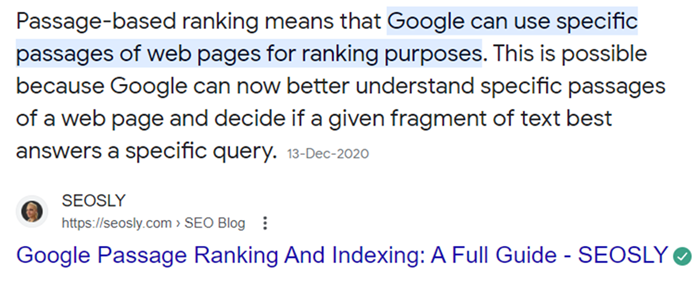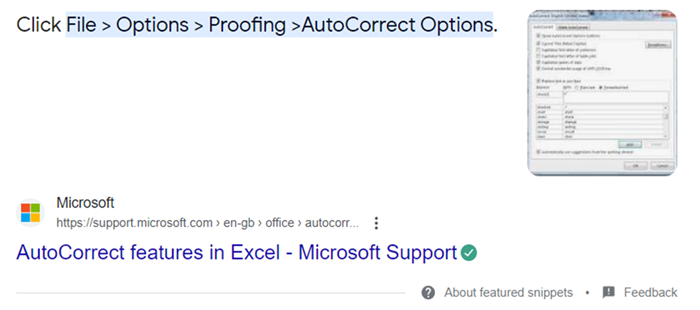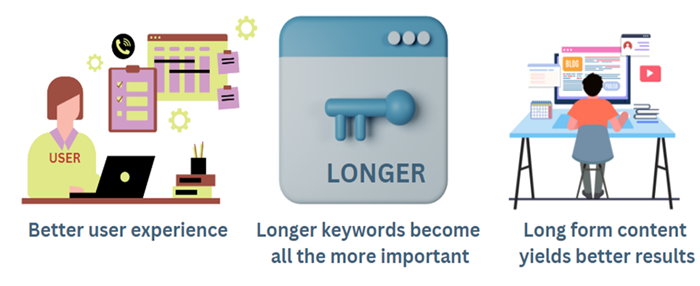The algorithms must be updated often in addition to learning to function as planned.
This takes us to passage ranking, one of the various Google search upgrades. It’s a minor update that will enable the search engine better analyse material and provide the most relevant results to users. There is no cause to be concerned about this upgrade or to go insane attempting to update your material.
However, this doesn’t imply that the update is unimportant. This article will discuss passage ranking.
What Is Passage Ranking?
Google passage ranking or indexing is a tool that automatically inserts pieces of sites into the results of search engines, even when the web page addresses a somewhat different topic from the primary one.
Google has been able to locate and show the specific part of data that responds to a searcher’s query ever since the release of this upgrade, which went into effect on February 10th, 2021. It shows in the SERP at position zero.
According to Google, passage-based indexing helps discover “that needle in a haystack” since Google will now grasp not just the main topic of the web page but also the exact subtopics to which each passage applies.

How Does Google Passage Ranking Function?
It’s critical to understand that Google Passage Ranking does not affect how SERPs work for users. Not in the apparent sense, at least. This upgrade merely altered Google AI’s understanding of site material and data regarding the relevance of a specific search query.
That implies that Google may now find a very particular sentence, paragraph, or portion of information inside a web page that answers a long-tail term or topic. Google uses “BERT and neural networks” to understand content and rank sections better when appropriate.
When completing Google searches, Google Chrome users may discover an additional function associated with Google Passages. If you open any of the website links on the first page of results after inputting your search query, there’s a strong chance it’s a jump link that sends you down to a highlighted part of the material that Google feels answers your question.
Explore our latest online courses and learn new skills at your own pace. Enroll and become a certified expert to boost your career.
Difference Between Google Passage Ranking and Featured Snippets
The primary areas of distinction are −
| Google Passage Ranking | Featured Snippets |
|---|---|
| Passage Ranking is the latest update focusing on particular web material parts. | The Featured Snippet algorithm indexes the whole website. |
| It splits the content into several sections. | It views the information as a whole, providing a broad picture of a subject. |
| On the other hand, Google passage ranking takes the user to the specific point in the text where the solution was found. | When the user clicks on the brought-out snippet, Google directs them to the domain on which the response was based. |

Why Is Passage Ranking Beneficial?
Let’s discuss the reasons as to why one should be concerned about passage ranking now that we have understood what it is and the way it functions, whether this modification produces any benefits or is merely a minor adjustment that can be ignored.
There are multiple pros associated with passage ranking −
- Focusing on consumers instead of Google bots − Google continues to demonstrate that it prefers website proprietors to create relevant material that consumers find useful instead of what search bots demand.
- Long-tail keywords become all the more important − Long-tail keywords, along with associated phrases, are likely to aid with passage indexing, so add words and longer terms.
- Increased benefits of long-form content − This change allows longer content to rank better for more targeted keywords.

What Effect Does Passage Ranking Have On SEO?
It won’t have any major effect on the SEO for most websites. Websites that detect a change will most likely experience a slight increase in traffic.
Though, there may be a couple of minor alterations worth taking down.
Because Google now employs passage indexing to annotate and separately categorise chunks of the same page, long-form material obtains the upper hand. It has a far greater chance of ranking for more keywords. They may enjoy a significant increase in traffic.
It has become more vital than ever for websites to use suitable on-page SEO approaches, like selecting appropriate headers and optimising anchor texts. Pages with less optimisation but higher quality content may outrank you.
How Many Searches Will This Change Affect?
The update will affect 7% of all inquiries worldwide. This is a significant amount so we may anticipate some adjustments.
Webmasters predict that rankings for most websites will improve since web pages will be relevant for various keywords (particularly long-tail specialized keywords) rather than just those connected to their core theme.
Optimise for Passage Indexing
Given what we currently know regarding what Google is scanning for right now, here’s how you can stay up with algorithm and ranking changes −
Deliver top-notch content that provides solutions
Your material should, first and foremost, be informative, answering all of the essential queries that consumers may have. As a content creator, you should be fluent and clear about the information you share.
Google is unable to rank a website with disorganised and ambiguous content. The more organised and valuable your material, the higher will be your Google ranking.
Use appropriate header tags and schema markups
H tags are in charge of attracting the eye of search engines. It is important to note that “Heading 1” is critical and should include the primary keyword.
When utilising H2 for a text, ensure it incorporates terms from latent semantic indexing (LSI). Including LSI keywords will assist Google in fully grasping the context of your article.
Long-form content with relevant keywords
The more significant number of keywords you rely on, the longer your written content will be, and Google will rank these individual terms independently.
Add new metrics, links, and resources to long-form postings.
Using specific questions
Using target queries while developing SEO content is strongly recommended. The most fundamental inquiries are what, who, when, why, and where of a particular issue.
Conclusion
The search engine is committed to offering the most excellent possible user experience. Google’s modest upgrade will assist consumers in receiving the most relevant answers to their inquiries.
Bear in mind that a large number of webmasters won’t have to implement any changes and will not suffer Google penalties. Long-form web pages may see a little increase in rankings and traffic.
Leave a Reply